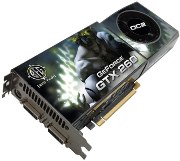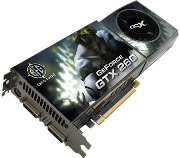
Con il comunicato stampa di seguito allegato, BFG Technologies ha lanciato due nuove schede grafiche basate sulla tecnologia di NVIDIA. Si tratta delle GeForce GTX 260 OC2 e BFG GeForce GTX 260 OCX, entrambe "factory overclocked", ovvero tali da esibire valori per la frequenza di clock di core grafico, unità shader e V-RAM più elevati di quelli reference.
Seguono le foto e le frequenze operative delle nuove GTX 260.
BFG GeForce GTX 260 OC2

[Immagine ad alta risoluzione]
- Dimensione/Tipo della RAM: 896MB GDDR3
- Core Clock: 630MHz (vs. 576MHz standard)
- Shader Clock: 1350MHz (vs. 1242MHz standard)
- Data Rate della RAM: 2126MHz (vs. 1998MHz standard)
BFG GeForce GTX 260 OCX

[Immagine ad alta risoluzione]
- Dimensione/Tipo della RAM: 896MB GDDR3
- Core Clock: 655MHz (vs. 576MHz standard)
- Shader Clock: 1404MHz (vs. 1242MHz standard)
- Data Rate della RAM: 2250MHz (vs. 1998MHz standard)
Le nuove card di BFG risultano essere dunque più veloci delle GeForce GTX 260 ordinarie; il produttore, che non ha indicato però l'MSRP delle schede, ne ha annunciato la commercializzazione a partire dal prossimo 7 Luglio nei mercati nordamericano ed europeo.

Lake Forest, IL – (June 30, 2008) – BFG Technologies, Inc., the leading North American and European supplier of advanced NVIDIA-based 3D graphics cards, power supplies and other PC enthusiast products, announced today the BFG GeForce GTX 260 OC2 and the BFG GeForce GTX 260 OCX factory overclocked graphics cards.
Backed with 24/7/365 free technical support and a lifetime warranty, the BFG GeForce GTX 260 OC2 and OCX versions are factory overclocked graphics cards that go through extensive testing to find the right mix of speeds for the core, memory, and shader clocks that will produce the best performance and uncompromised stability at each level.
"Customers should be aware that companies who follow our lead and factory overclock their GPUs tend to rush into setting clocks as high as possible just to claim the highest MHz. However, without extensive testing these cards are likely to be more unstable and prone to a shorter life than our BFG OC series cards", said John Malley, senior director of marketing for BFG Technologies. "The rigorous testing process we put our GeForce GTX 260 OC2 and OCX cards through to find the optimal speeds for the core, memory, and shader clocks gives customers a more stable, longer lasting, and better performing card overall".
BFG GeForce GTX 260 OC2
- Memory: 896MB GDDR3
- Core Clock: 630MHz (vs. 576MHz standard)
- Shader Clock: 1350MHz (vs. 1242MHz standard)
- Memory Data Rate: 2126MHz (vs. 1998MHz standard)
BFG GeForce GTX 260 OCX
- Memory: 896MB GDDR3
- Core Clock: 655MHz (vs. 576MHz standard)
- Shader Clock: 1404MHz (vs. 1242MHz standard)
- Memory Data Rate: 2250MHz (vs. 1998MHz standard)
Eligible for the BFG Trade Up program
Within 100 days of purchase, the BFG GeForce GTX 260 OC2 and BFG GeForce GTX 260 OCX graphics cards can be traded up to a BFG graphics card of greater performance and price, and the customer only pays the difference in price, plus applicable taxes and shipping. Currently the Trade Up program is only available in North America. Trade Up program for Europe is planned to launch this year. Learn more at www.bfgtech.com/tradeupprogram.aspx.
Availability
The BFG GeForce GTX 260 OC2 and BFG GeForce GTX 260 OCX will be available at leading online and in-store retailers throughout North America and Europe beginning the week of July 7, 2008. Visit www.bfgtech.com for more information.
Source: BFG Technologies Press Release
Links